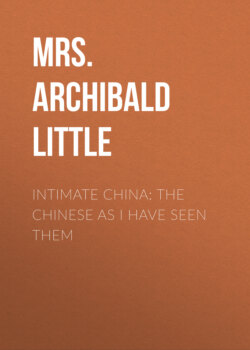Читать книгу Intimate China: The Chinese as I Have Seen Them - Archibald Mrs. Little - Страница 17
На сайте Литреса книга снята с продажи.
CHAPTER V.
CURRENT COIN IN CHINA.
ОглавлениеTable of Contents
Taels.—Dollars.—Exchange.—Silver Shoes.—Foreign Mints.
She was not long out from England, and a comprador order was as yet an unnatural phenomenon to her. She supposed it was something like a cheque upon a bank, or a circular note, with which Continental travel had made her intimately acquainted. "What is the value of a dollar in English money?" she had asked before starting on her tour from Shanghai. "Oh yes, I understand it depends upon the exchange. I used always to keep myself in gloves on what one gained in Italy. Now it is horrid; one gains nothing. I don't quite know why it is. But how much about is the dollar worth, when exchange is—is—nothing particular?" Then she had such long speeches made to her, and heard so much conflicting information, she felt deafened, but ultimately arrived at the conclusion that there were about—yes! about six dollars in an English pound, and there ought not to be so many. Now, somewhat to her consternation, she discovered that her comprador orders had taels printed upon them; so she made out her order in taels, secretly wondering what they were. She had never seen them.
"Do you think I got the right exchange?" she asked of her Boy; then, trying to suit herself to his needs, and speak English "as it is spoke," "He pay my right money?"
"My no savey what thing one taelee catchee Hankow side," said the Boy, with flippancy but decision. He came from farther inside the province.
She felt abashed, and supposed she must just take her money, hoping it was right. Next time she would be wiser. Arrived at Ichang, she scratched out taels, and was about to write in dollars.
"Dollars! Dollars aren't known at Ichang," said the Captain.
"What had I better do?" she asked of the oldest resident. Again she was overwhelmed with words. But she gathered she ought to ask for taels.
"Taels don't exist," said the Captain. "I never saw a tael, did you? He'll bring you your money in lumps of silver, if you don't take care."
"Yes," said the old resident, "you had better not get lumps of silver."
"They vary in value, according to the quality of the silver," persisted the Captain. "You won't know what to do with them. You can't break them up. You will have to weigh them. And what can you pay for in lumps of silver? Nobody will take them for anything you want to buy."
They actually both talked to her as if she wished for solid, uncoined lumps of silver. She felt confounded! But, determined to preserve her calm, she said, "I had better write, and say I want so many strings of cash, then, had I? Ten thousand cash? Twenty thousand cash? I can't carry them, you know; and I don't know where I can keep them. But I must have at least so much money in hand, if it is only to pay for my washing."
"Pay for your washing!" they both burst out, as if that were a most superfluous proceeding.
"I wouldn't write for cash, I think," began a third adviser. "I would write down how many taels you require, and say you'd take it in cash."
"Then I shall never know if I get the right amount."
"A—h!" they all said, waving their hands, as if no one ever did know if he got the right amount in China.
"It varies. It varies from day to day," said the oldest resident.
Needless to relate, she never saw those cash, never heard how many she had received, nor where they were stowed away. The Boy said he had them, it was all right. He said also that at Ichang it was very shocking how few cash they gave for the tael.
She was determined she would learn Chinese, of course! Was she not just out from home? And being just out from home, and anxious to be polite to every one, it was a trouble to her mind that she did not know how to greet her teacher when he came. She stood up, and rubbed her hands together, which, she understood was the Chinese for a curtsey; but it seemed feeble without a word, so she said, "Koom Shee! Koom Shee!" as she had heard the country people say.
"Oh! you should not say Koom Shee! Koom Shee! Not to a teacher, who comes every day," said a Sinologue.
"He says it is quite right," said she. "I am sure I understand that much. But he said I could also say Tsao!"
"Oh no—no! Not Tsao," said the Sinologue; but he never made any suggestion as to what she should say.
"I could not think what I ought to say when he went away," she continued. "But he says Man man tso."
"Oh no! that is a great deal too much to a teacher who comes every day."
